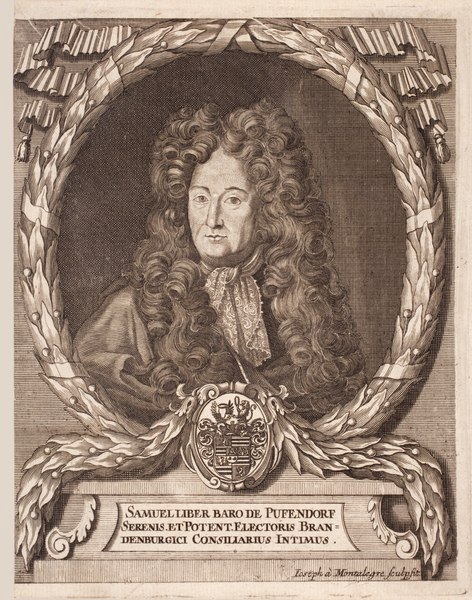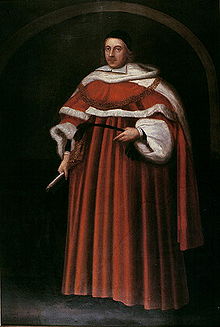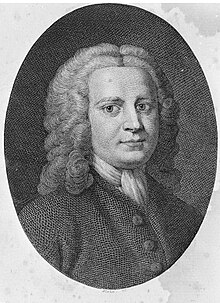
Samuel Pufendorf
Law of Nature and Nations
Of the Power of Mankind Over Things
「1868」Samuel Pufendorf, “Of the Power of Mankind Over Things,” Book 4, Chapter 3 of The Law of Nature and Nations 「Google Books」 in Eight Books; Written in Latin by the Baroin Pufendorf, Counselor of State to His late Swedish Majesty, and to the Present King of Prussia Contents; 313-317 (1672; Oxford, 1703) 135.
Chap. III. Of the Power of Mankind over Things.
Sect. 1. The main part of Law and Right ins concer’d about Things
Sect. 2. By the Good Pleasure Of GOD, Man is allowed the Use of other Creatures.
Sect. 3. Vegetables may be consumed without the least Injury.
Now as for Vegetables, and other things destitute of sense, there seems with regard to them, to be no manner of difficulty in this point; it being impossible to discover that they suffer any hard Treatment, or unjust Hurt, when they are consum’d by Men; especially, since they must necessarily perish and be destroy’d by Beasts, or by the speedy turn of the Year, and the change of the Seasons; and father, since many of them have nevr been produced without Human pains and endeavours. The Superstition of the Egyptians; in abstaining from certain Por-Herbs, is not of weigh enough to give us and stop in the present Determination (b). (314)
Sect. 4. Doubts have been proposed, as to the killing, and eating of Living Creatures.
But then, as to Living Creatures, which are ednu’d with a sense of their own Being, and cannot leave it without Pain and Trouble, the Point appears in some measures dubious, to many who have consider’d the Liberty of Men against Brutes, only on the Principles of Reason. For, from God allowing the first Man to have Dominion over other Animals, it doth not presently flow as an evident Consequence, that he was at the same time invested with so wide a Commission, so infinite a License, as they he might slay them even for unnecessary Uses (i): Fro Man hath Dominion too over Man, and yet cannot in the least pretend to have such License as this against his Fellows. Nor could Men have complain’d that the Divine Goodness was sparing towards them, or had made an ill Provision for their Necessities, though they should have been denied a Power over the Life of Animals; at least of such as did not threaten any Hurt or Danger to the Life of Men: Inasmuch as the Work of those Creatures in cultivating the Earth, together with what comes from them otherwise, as Milk, Eggs. (such as a not necessary for the propagation of the Species,) Wool, and the like, might have been sufficient to sustain Men in a tolerable way of Living. Nor did God by commanding Men to sacrifice them, as a Token of Divine Worship, confer any Power of Privilege of turning them at pleasure into Food. For such Things are lawful to Mankind only by some peculiar Command of God, may still remain unlawful, except in that Particular Case. Hence it was that many of the Ancient Philosophers utterly disapprov’d of the Practice. For why should Man on the are account of superfluous Pleasure, rob an harmless Animal of that Life which it enjoys by the Gift of the same Common Creator? Especially, Since even the example of the fiercest Wild-Beasts, of Lyons, Wolves, and other devourers of Flesh, will do them no Service, if urg’d in their Excuse. For these are so framd’ by Nature, as to not be able to support Life, without feasting on Blood, and to loath and reject the Common Provision afforded by earth. Whereas Men are not under the like case of Necessity; receiving very Commodious Nourishment form other Food, and being oblig’d to prepare Flesh by dressing or seasoning it, before they can make it agreeable to their Digestion. We hear indeed of some Barbarous Nations, which make use of no Flesh or Fish but what is raw, and support themselves with that; as Rochfort (k) reports of the Coasts on Davis’s Streights. But the same Author tells us (l) of the inhabitants of the Province of Pasto in Peru, That they eat no manner of Flesh; and that if desired but only to taste any, their Answer is, They are not Dogs.
Others have obser’d in relation to the present Enquiry, that whereas those Animals which naturally feed on Flesh, have their Fore-teeth oblong, sharp and divided from each other, that so by closing them with a deeper stroke, they may grind and separate the Prey: Man’s Teeth are short, join’d one to another, and spreading round, after the manner of those Animals which live on Herbs and Fruits. And that on this account we are necessitated to make use of Knives for dividing the Flesh we eat; whilst the Creatures which eat this as their Natural food, stand in on need of Such Assistances of Inventions; That thus we see children by the bare impulse of Nature, loving Fruit beyond all other Provisions, and Preferring Apples, Cherries, and Nuts, to the most exquisite Dainties of Flesh; because in them Nature is not corrupted, nor their Appetites debauch’d by Ill Customs of Eating (m). It is father evident, that the fiercest and cruelty of Man, having been first excited, encourag’d and harden’d by the Slaughter of Beasts, afterwards broke out against their own Kind; and those who had taken delight in destroying the Harmless Race of Dumb Creatures, make it their next step to murder weak and defencelsess Man. (n) Diogenes Laertius in his Life of Pythagoras (o) reports that Philosopher to have forbid the killing of Animals. As enjoying the same Common Right of Life and Soul with our selves. This indeed (as the Historian goes on,) was his Pretence: But the true reason of his commanding his Followers to abstain from all Living Creatures, was, that he might exercise and train Man up in a more easy Method of Food, by means which they might always have read at hand a large provision of Meat, requiring no Fire to dress it; and as much Drink as they had plain Water. For this way of Sustenance he though most proper to produce Health of Body, and Quickness of Mind (p). Porphyry (q) is very prolix in attempting to shew, that abstinence from Flesh is in the highest manner the Duty of Philosophers, who place all their Happiness in God, and in the imitation of the Divine Nature. Amongst a great number of Arguments, the Substance of which hath been for the most part already deliver’d, he endeavours to demonstrate, That all Souls endued with Sense and Memory, are likewise partakers of Reason; and that since we may discover thus much in other Animals, we ought to extend our Justice to them, which consists principally in offering no hurt without due Cause. And that we have a convincing Evidence of the Reason of Brutes, in their being capable of Madness and Distraction. To this time the Benjans in Cambay believing the Soul of Man to remove, at Death, into the Bodies of Beast, never harm any Living Creatures, nor dare to turn them into food: Nay they have Hospitals erected on purpose, for the reception of diseased and maimed Birds. (r) Phil. Baldam in his description of the Island Ceilon, reports, That the Bramines, even when converted to Christianity, keep their old Method of living; and that if they be encounter’d with that Text of Scripture, To the Clean all things are clean; they reply in another, that, The Kingdom of God is not in Meat and Drink: that they have been ever accustom’d to their light and easy Diet, and find themselves very well upon it. Thus the whole Nation of Apalchitae, of old, never tasted of Flesh or Fish; ’til they learnt this custom from the Europeans (c). (314-315)
Sect. 5. Which is, nevertheless, defended, as lawful
Sect. 6. The Abuse of our Right over Beasts, worthy of Censure.
Yet the Abuse of his Power, and especially such as is attended with foolish Cruelty and Barbarity, deserves to come under censure is beyond dispute. For, as it is the Interest of particular States, that no person squander away, or waste and spoil his Possessions; so it turns to the prejudice of the Universal Society of Mankind, and to the Dishonour of GOD, the Giver of so great Gifts, to consume them idely and wantonly, without promoting any Benefit of Advantage of Life. Thus GOD was pleas’d especially to command the Jews, To allow their Cattle a Rest from all Work, on the Seventh Day (z). Plutarch (y) tells us, The Athenians inflicted a Penalty on a certain person who had strip’d a Ram of his Skin whilst alive.. adn the Followers of Pythagoras, as Porphyry (z) observes, made Gentleness and Mercy towards Beasts, the Introduction of Love and Pity Towards Men.
_____
Biography-Commentary-Excerpts
Reference-Reprints-Reviews
「1868」 Howard Malcom, “Cruelty to Brutes,” in References to the Principal Works in Every Department of Religious Literature (Boston, 1868).



